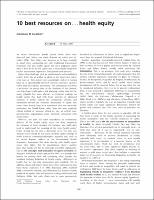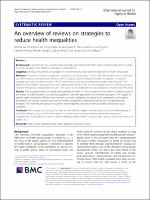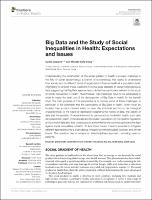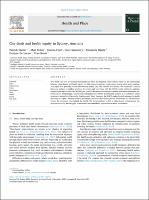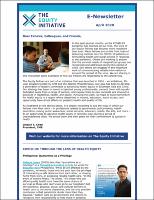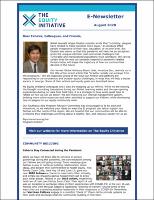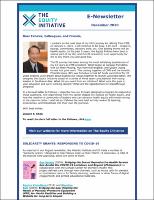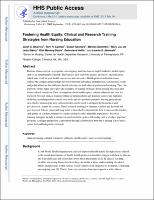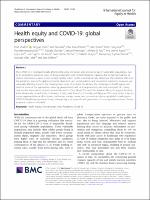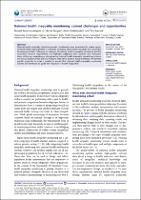Browsing by Subject "Health equity"
Now showing items 1-10 of 10
-
10 best resources on ... health equity
(Oxford University Press in association with The London School of Hygiene and Tropical Medicine, 2007)
An astute bureaucratic pundit named Rufus Miles once observed that ‘where you stand depends on where you sit’ (Miles 1978). This ‘Miles Law’ deserves to be kept centrally in mind when considering not only traditional bureaucratic behaviour, but also health equity; for one's judgment about what's ‘best’ in the health equity area is unavoidably shaped by his/her institutional experience, background and interests.Rather than challenge such an unfortunately well-established reality, better for an author to admit at the outset just where (s)he has ... -
An overview of reviews on strategies to reduce health inequalities
(2020-12)
Background: Governments are incentivized to develop and implement health action programs focused on equity to ensure progress with effective strategies or interventions. Objective: Identify and synthesize strategies or interventions that facilitate the reduction of health inequalities. Methods: A systematic search strategy was carried out up until August 2019 in MEDLINE (Ovid), Embase (Elsevier), Cochrane Database of Systematic Reviews, LILACS, Scopus, Scielo and Epistemonikos. In addition, a snowball strategy was used. Literature reviews (LRs) ... -
Big Data and the Study of Social Inequalities in Health: Expectations and Issues
(Frontiers in Public Health, 2018-10-26)
Understanding the construction of the social gradient in health is a major challenge in the field of social epidemiology, a branch of epidemiology that seeks to understand how society and its different forms of organization influence health at a population level. Attempting to answer these questions involves large datasets of varied heterogeneous data suggesting that Big Data approaches could be then particularly relevant to the study of social inequalities in health. Nevertheless, real challenges have to be addressed in order to make the ... -
City deals and health equity in Sydney, Australia
(2022-01)
City Deals’ are new governance instruments for urban development. Vast evidence exists on the relationship between urban factors and health equity, but little research applies a health equity lens to urban policy-making. This paper does precisely that for the Western Sydney City Deal (WSCD) in Australia. We conducted a critical discourse analysis of publicly available documents and interviews with the WSCD’s main architects, applying insights from relevant theories. We find ‘pro-growth’ discourse to encourage economic investment dominates any ... -
EI Newsletter: April 2020
(The Equity Initiative, 2020-04) -
EI Newsletter: August 2020
(The Equity Initiative, 2020-08) -
EI Newsletter: December 2020
(The Equity Initiative, 2020-12) -
Fostering Health Equity: Clinical and Research Training Strategies from Nursing Education
(The Kaohsiung Journal of Medical Sciences, 2009)
Racism, ethnocentrism, segregation, stereotyping, and classism are tightly linked to health equity and social determinants of health. They lead to lack of power, money, resources, and education which may result in poor health care access and outcomes. Health profession faculties must address the complex relationships that exist between individual, interpersonal, institutional, social and political factors that influence health outcomes in both clinical and research training. Thus, the purposes of this paper are to provide examples of training ... -
Health equity and COVID-19: global perspectives
(2020-12)
The COVID-19 is disproportionally affecting the poor, minorities and a broad range of vulnerable populations, due to its inequitable spread in areas of dense population and limited mitigation capacity due to high prevalence of chronic conditions or poor access to high quality public health and medical care. Moreover, the collateral effects of the pandemic due to the global economic downturn, and social isolation and movement restriction measures, are unequally affecting those in the lowest power strata of societies. To address the challenges to ... -
National health inequality monitoring: current challenges and opportunities
(Informa UK Limited, trading as Taylor & Francis Group, 2018-12-03)
National health inequality monitoring needs considerably more investment to realize equityoriented health improvements in countries, including advancement towards the Sustainable Development Goals. Following an overview of national health inequality monitoring and the associated resource requirements, we highlight challenges that countries may encounter when setting up, expanding or strengthening national health inequality monitoring systems, and discuss opportunities and key initiatives that aim to address these challenges. We provide specific ...

